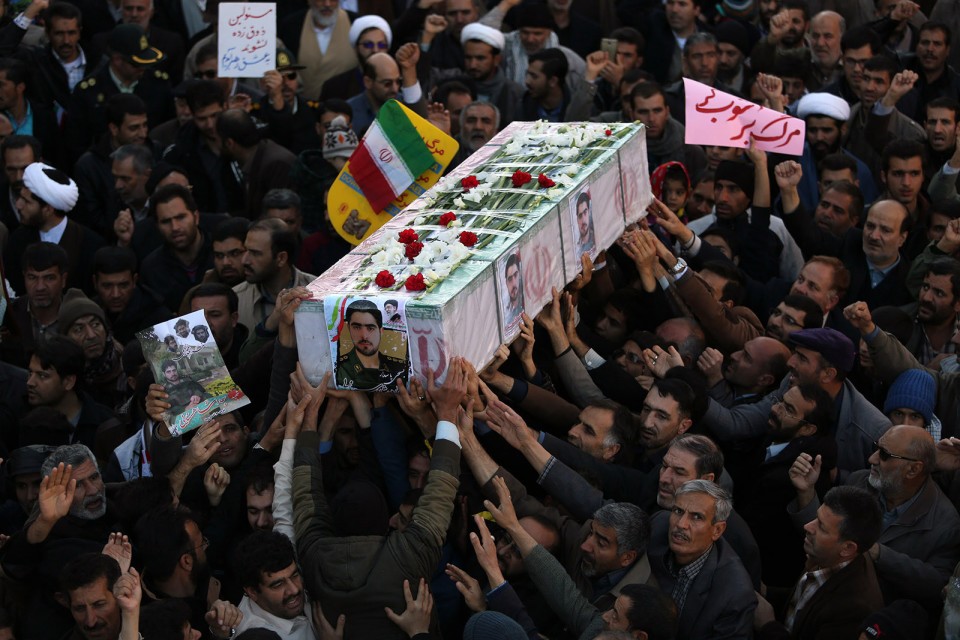Ramin Jahanbegloo is an Iranian dissident philosopher and the author of “Conversations with Isaiah Berlin” and “Reading Gandhi in Cairo.” In 2006 he was arrested in Tehran, where he was detained for 126 days in solitary confinement. He now lives in exile in Toronto.
The unrest that started last week all over Iran, and which has resulted in the deaths of at least 21 people, has many causes, ranging from grievances relating to the country’s economy and discontent with its political system. For the first time, however, since the protests of 2009 (better known as the Green Movement), the current wave has put pressure on both Iran’s supreme leader, Ayatollah Ali Khamenei, and its more moderate president, Hassan Rouhani. Though this is difficult to confirm, it seems that the demonstrations that started in the holy city of Mashhad on Dec. 28 were organized by hard-liners, who encouraged the rioters to direct their economic frustrations against the reformist Rouhani.
The organizers had no idea that a small regional expression of discontent would take on a life of its own and turn into a national uprising. The general demonstrations in today’s Iran are caused by the same type of anger and frustrations driving other anti-government protests around the Middle East: a combination of rising living costs, economic corruption and political repression. But what is unique about the present unrest in Iran is that it is not only revealing discontent with a politically and economically authoritarian regime, but it is also representing the deep sense of frustration among young Iranians who can envision no future for themselves under current conditions.
Strangely, many of the youngsters who are now protesting on the streets of Iran in the face of death at the hands of the riot police, voted last year for Rouhani. Now, however, they feel betrayed by him and his government. In contrast with the Trump administration, which quickly jumped on the bandwagon by backing the riots, many ordinary Iranians support the protests in spirit but are worried by the fact that the Revolutionary Guard Corps (IRGC) and the Basij militia, who hold the monopoly on violence in Iran, are actually allowing these protests to take place — apparently with an eye to using them as a pretext for expanding their own authority. We should not forget that, while the demonstrations are taking place in a spirit of nonviolence and with no organized leadership behind them, the regime’s coercive apparatus is both well-organized and heavily armed.
This said, the scope of the protests remains unclear. But one thing is certain: If the morning demonstrations and the night riots continue in at least a handful of cities across the country, the protesters will end up in a violent confrontation with the Iranian military and security forces. The Revolutionary Guard, which organized the crackdown against protesters in 2009, has said in a statement that they “will not allow the country to be hurt.” This, in my view, is a sign that they are preparing the sort of coup d’etat that many people have been expecting for a long time.
It is worth noting that the IRGC is an ideological institution in charge of safeguarding the Islamist regime. The constitution entitles the IRGC to engage in economic and educational activities. As its economic might has grown in the past decade, so, too, have its political influence and cultural role. Consequently, the IRGC and the Basij, which have played crucial roles in controlling Iranian politics and preventing democratic development, have also bolstered their parts in shaping Iranian foreign policy in the Middle East, with its support of sympathetic forces in Lebanon, Syria and Yemen.
Once again, it appears that the future of civil rights movements and the democratization process in Iran will be determined by the will of the ruling Revolutionary Guard who, amid rumors of Khamenei’s ill health, are preparing to seize a greater political role both by defending national sovereignty and preventing the consolidation of democracy. What is certain is that the democratic future of Iran is still not in the hands of those who are suffering for it on the streets of Iran.
This was produced by The WorldPost, a partnership of the Berggruen Institute and The Washington Post.




